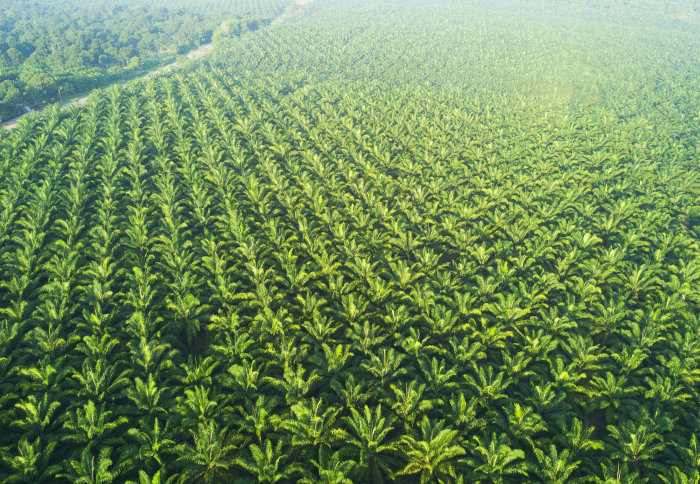Could Africa have a sustainable palm industry?

Palm oil plantation in Asia
Palm plantations are associated with deforestation and ecological harm, but researchers are pointing to ways things can be done differently in Africa.
Palm products, and especially palm oil, are increasingly used in thousands of products across the world, from pizza to toothpaste. However, palm plantations in Asia have come under scrutiny from the internal community in recent years for associations with deforestation and environmental degradation.
Now, palm agriculture is on the rise in Africa, and Imperial researchers have been looking at how there might be an opportunity there for a more sustainable palm industry.
Hayley Dunning spoke to Professor Vincent Savolainen (VS), from the Department of Life Sciences, and Dr Tilly Collins (TC), from the Centre for Environmental Policy, about a new report exploring pathways to sustainable palm in Africa, recently published in Current Research in Environmental Sustainability.
What are the potential problems with palm agriculture?
VS: Palm is often grown as a monoculture – where it is the only species grown in a large plantation, and plantations often replace native forests. Both of these factors can vastly reduce local biodiversity by limiting the plants and other animals that can live alongside the palm. To clear land for palm plantations, forests are often burned, which can also create local air pollution and contributes to greenhouse gas emissions and climate change.
Why is palm agriculture growing in Africa?
TC: The tropics are a prime area for growing palm, and small local business have existed for a long time. However, as demand grows, operations are growing larger and becoming more industrialised. The challenge is how to expand in a way that doesn’t cause undue damage to the environment and includes local cultures.
How can palm be grown in a way that does less damage to the environment?
VS: One way is intercropping, where other crop plants are grown alongside the palm. This improves the biodiversity of the plantation by providing habitats for different species. This comes with added benefits such as diversified incomes when crops like bananas are grown, and provides enhanced ‘ecosystem services’, such as improving the moisture of the soil and reducing the need to weed.

TC: An important way to make palm agriculture more sustainable is to reuse waste, and in many cases to use materials that commercial farming considers waste in productive ways. For example, palm trunks can be used to feed palm weevils, which themselves are a traditional source of food but are not currently farmed at large scale. Farming palm weevils provides an opportunity for a truly circular economy; the waste from farming can then be used to improve the fertility of the soil used to grow more palm and other food intercrops.
How could crop engineering help palm industries thrive sustainably?
VS: While large regions around the equator are currently well suited for growing palm, with climate change this may not be true for much longer. Genetic engineering and directed breeding can help create palm varieties that are most resistant to drought and high-salt soils. This could not only allow them to continue to be grown in areas currently suitable, but could allow them to be grown in new areas that are not normally suited to wide plant growth. In this way, they would not be replacing native plants and forests, as is often the case with Asian plantations.
These innovations could also help palm agriculture become more efficient, growing more crop with fewer resources, providing the extra food needed in a world with an expanding population while reducing the damage to the environment.
What needs to happen to make these ideas a reality?
VS: A sustainable palm industry requires ‘systems thinking’ – integrating social, economic and natural factors into the design of the industry. Within this, circular economies are key, such as the use of palm trunk waste as a source for palm weevil farming.
All this needs to be led by internal legislation that has the local population as its focus. Their rights as farmers must be protected so they are incentivised to follow sustainable practices.
TC: The reputation of palm farming in Africa could be improved by explicit inclusion of biodiversity and human benefits into the cropping cycle. Benefits could expand beyond the obvious – palm weevil farming is traditionally an activity led by women, and tapping into that knowledge and encouraging their farming operations could lead to the further empowerment of women in local communities.
-
‘Systems thinking creates opportunities for a circular economy and sustainable palm agriculture in Africa’ by Vincent Savolainen et al. is published in Current Research in Environmental Sustainability.
Top image credit: nelzajamal/Shutterstock
Weevil larva credit: lauro55/Shutterstock
Article text (excluding photos or graphics) © Imperial College London.
Photos and graphics subject to third party copyright used with permission or © Imperial College London.
Reporter
Hayley Dunning
Communications Division